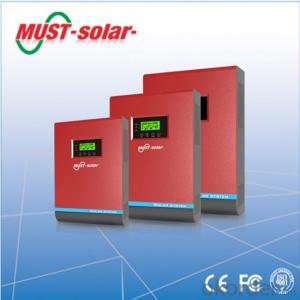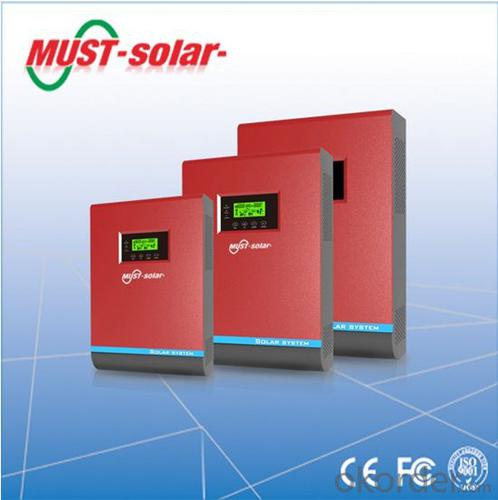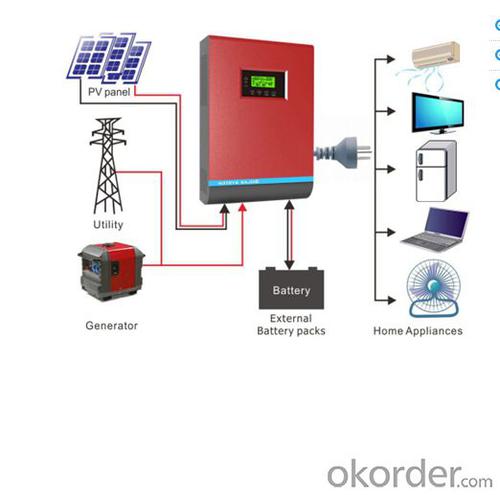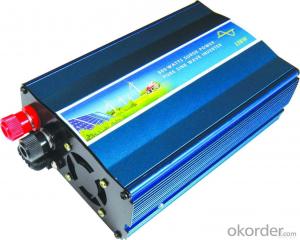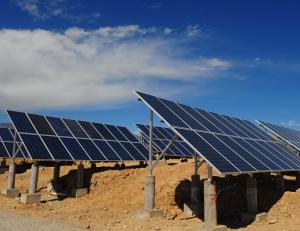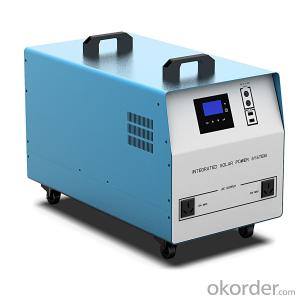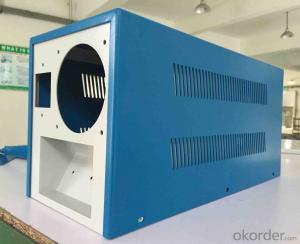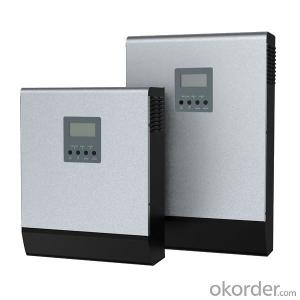Solar Inverter 1kw Off Grid 1kVA-5kVA Built-in 50APwm 60Amppt Charge Controller Parallel Function
- Loading Port:
- China main port
- Payment Terms:
- TT or LC
- Min Order Qty:
- 1500 watt
- Supply Capability:
- 3000000 watt/month
OKorder Service Pledge
OKorder Financial Service
You Might Also Like
1. Structure of Solar Inverter Off Grid 1kva -5kva Built in 50APWM 60AMPPT Charge Controller Parallel Function Description
A solar inverter, or PV inverter, or Solar converter, converts the variable direct current (DC) output of a photovoltaic (PV) solar panel into a
utility frequency alternating current (AC) that can be fed into a commercial electrical grid or used by a local, off-grid electrical network. It is
a critical BOS–component in a photovoltaic system, allowing the use of ordinary AC-powered equipment. Solar inverters have special
functions adapted for use with photovoltaic arrays, including maximum power point tracking and anti-islanding protection.
2. Main Features of Solar Inverter Off Grid 1kva -5kva Built in 50APWM 60AMPPT Charge Controller Parallel Function
• Pure sine wave inverter
• Selectable input voltage range for home appliances and personal computers
• Selectable charging current based on applications
• Configurable AC/Solar input priority via LCD setting
• Compatible to mains voltage or generator power
• Parallel operation with up to 4 units only available for PV200 4KVA/5KVA
• Auto restart while AC is recovering
• Overload and short circuit protection
• Smart battery charger design for optimized battery performance
• Cold start function
3. Solar Inverter Solar Inverter Off Grid 1kva -5kva Built in 50APWM 60AMPPT Charge Controller Parallel Function Images
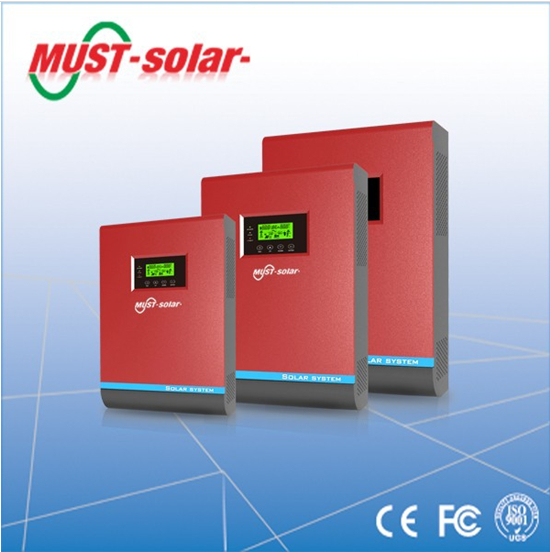
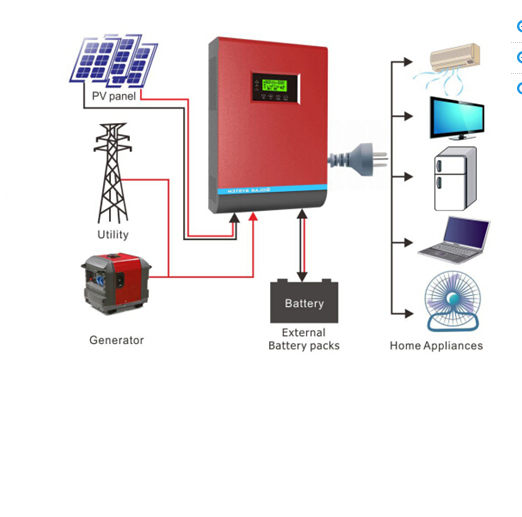
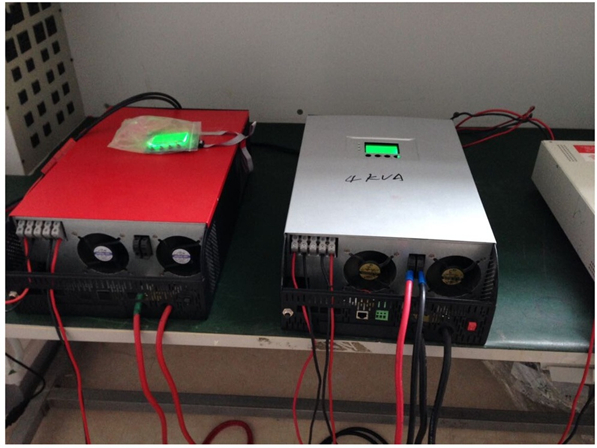
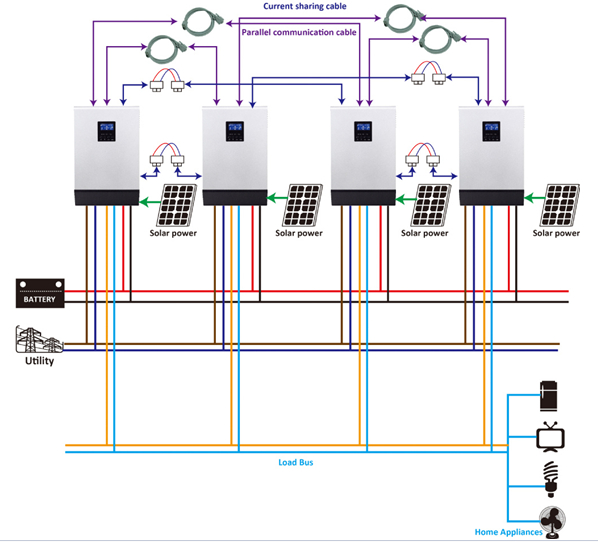
4. Solar Inverter Off Grid 1kva -5kva Built in 50APWM 60AMPPT Charge Controller Parallel Function Specification
RATED POWER | 1000VA / 800W | 2000VA/ | 3000VA / 2400W | 4000VA / 3200W | 5000VA / 4000W |
1600W | |||||
INPUT | |||||
Voltage | 230 VAC | ||||
Selectable Voltage Range | 170-280 VAC (For Personal Computers) ; 90-280 VAC (For Home Appliances) | ||||
Frequency Range | 50 Hz/60 Hz (Auto sensing) | ||||
OUTPUT | |||||
AC Voltage Regulation | 230 VAC ± 5% | ||||
(Batt. Mode) | |||||
Surge Power | 2000VA | 4000VA | 6000VA | 8000VA | 10000VA |
Efficiency (Peak) | 90% | 93% | |||
Transfer Time | 10 ms (For Personal Computers) ; 20 ms (For Home Appliances) | ||||
Waveform | Pure sine wave | ||||
BATTERY | |||||
Battery Voltage | 12 VDC | 24 VDC | 48 VDC | ||
Floating Charge Voltage | 13.5 VDC | 27 VDC | 54 VDC | ||
Overcharge Protection | 15 VDC | 30 VDC | 60 VDC | ||
Maximum Charge Current | 10 A or 20 A | 20 A or 30 A | 60 A | ||
SOLAR CHARGER (OPTION) | |||||
Charging Current | 50 A | ||||
Maximum PV Array Open Circuit Voltage | 30 VDC | 60 VDC | 105 VDC | ||
Standby power Consumption | 1 W | 2 W | 2 W | ||
PHYSICAL | |||||
Dimension, D x W x H (mm) | 95 x 240 x 316 | 100 x 272 x 355 | 125 x 297.5 x 468 | ||
Net Weight (kgs) | 5 | 6.4 | 6.9 | 9.8 | 9.8 |
OPERATING ENVIRONMENT | |||||
Humidity | 5% to 95% Relative Humidity(Non-condensing) | ||||
Operating Temperature | 0°C - 55°C | ||||
Storage Temperature | -15°C - 60°C | ||||
5. FAQ of Solar Inverter Off Grid 1kva -5kva Built in 50APWM 60AMPPT Charge Controller Parallel Function
Q1:Can we visit your factory?
A1:Sure,welcome at any time,seeing is believing.
Q2:Which payment terms can you accept?
A2:T/T,L/C,Moneygram,Paypal are available for us.
- Q: How do you calculate the efficiency of a solar inverter?
- To calculate the efficiency of a solar inverter, you need to divide the output power by the input power and multiply it by 100. The formula is: Efficiency = (Output Power / Input Power) * 100.
- Q: What is the role of a solar inverter in preventing electrical faults?
- The role of a solar inverter in preventing electrical faults is to convert the direct current (DC) electricity generated by solar panels into alternating current (AC) electricity that can be used in homes and businesses. In doing so, the inverter helps maintain a stable and consistent flow of electricity, which reduces the risk of electrical faults such as short circuits, overloads, or voltage fluctuations. It also includes various protection mechanisms, such as ground fault detection and interruption, to ensure the safety and reliability of the solar power system.
- Q: What is the role of a solar inverter in preventing system downtime?
- The role of a solar inverter in preventing system downtime is to efficiently convert the DC power generated by solar panels into AC power that can be used by electrical devices. It ensures the smooth operation of the solar power system by regulating the flow of electricity, monitoring voltage levels, and protecting against potential issues such as overloading or short circuits. By maintaining a stable and reliable power supply, the solar inverter plays a crucial role in minimizing system failures and downtime.
- Q: Installation and maintenance of photovoltaic grid - connected inverter
- photovoltaic systems Power generation system used in the cable must be connected firmly, good insulation and specifications appropriate.
- Q: How do you connect a solar inverter to the electrical grid?
- To connect a solar inverter to the electrical grid, you typically follow a few steps. First, ensure that your solar panels are properly installed and generating electricity. Then, connect the DC output of the solar panels to the DC input of the inverter. Next, connect the AC output of the inverter to your home's electrical distribution panel or directly to the electrical grid through a utility meter. Finally, consult with a qualified electrician to ensure that the installation meets all relevant safety and electrical codes.
- Q: Can a solar inverter be connected to a backup battery system?
- Yes, a solar inverter can be connected to a backup battery system. This allows the solar energy generated during the day to be stored in the backup battery system and used during times when the sun is not shining or during power outages.
- Q: Are solar inverters weatherproof?
- Yes, solar inverters are designed to be weatherproof. They are typically built to withstand various weather conditions such as rain, snow, and extreme temperatures. However, it is always recommended to consult the manufacturer's specifications and guidelines to ensure proper installation and protection against environmental factors.
- Q: Can a solar inverter be used with a solar-powered electric vehicle charging infrastructure?
- Yes, a solar inverter can be used with a solar-powered electric vehicle charging infrastructure. A solar inverter converts the direct current (DC) electricity generated by solar panels into alternating current (AC) electricity that can be used to charge electric vehicles. This allows for efficient and sustainable charging of electric vehicles using the power generated from solar energy.
- Q: Are there any limitations on the angle of the solar panels when using a solar inverter?
- Yes, there are limitations on the angle of the solar panels when using a solar inverter. The optimal angle for solar panels is typically determined based on the geographical location and the season. Deviating too much from the recommended angle can result in decreased energy production.
- Q: How does a solar inverter affect the value of a property?
- A solar inverter can positively impact the value of a property by enhancing its energy efficiency and reducing electricity costs. This renewable energy technology is attractive to potential buyers as it provides clean and sustainable power generation. Additionally, having a solar inverter installed can increase the overall appeal and marketability of a property, making it more desirable in today's environmentally conscious market.
Send your message to us
Solar Inverter 1kw Off Grid 1kVA-5kVA Built-in 50APwm 60Amppt Charge Controller Parallel Function
- Loading Port:
- China main port
- Payment Terms:
- TT or LC
- Min Order Qty:
- 1500 watt
- Supply Capability:
- 3000000 watt/month
OKorder Service Pledge
OKorder Financial Service
Similar products
Hot products
Hot Searches
Related keywords
